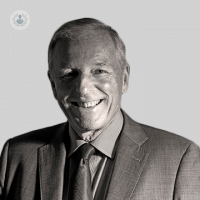How to mentally prepare for spinal surgery
Escrito por:The idea of undergoing spine surgery can seem terribly daunting to some people. Mr Richard Gullan, the most senior spine surgeon at the London Neurosurgery Partnership, reassures patients on what to expect and how the operation can save them from any future pain and disability…

What reassurance can you give to a patient about spinal surgery?
The most important thing to remember is that the proposed surgery is being offered to try and help you. It is not a panacea cure for all aches and pains. Surgery inevitably carries some risk, but thankfully in modern practice, this is usually very low indeed.
On a cautionary note, it is sensible to be careful of relying too much on information so readily available on the internet. This is not always refereed well and may be misleading. Also, the information may not really be of relevance to the condition you suffer and can cause confusion. However, there is much available on the internet and some of this can be very helpful for patients although the best thing to do is speak to your consultant.
Spinal surgery doesn’t always help and this is very disappointing for patients. However, it is not common that the surgery actually makes the condition “worse” but the operation discomfort and disruption are of course inevitable.
Why should I have spinal surgery?
In consenting to go ahead with an operation it is essential you appreciate why it is being done, the potential benefits and risks and that, in the end, it is your decision. If you are uneasy or uncomfortable to proceed, try and resolve this before coming into hospital for the operation.
Luckily most procedures are not “absolutely essential” but are done to try and improve the quality of your life and to try and reduce, or get rid of, miserable pain. This is obviously different from the situation where terrible consequences may occur, such as progressive neurological disability and paralysis, if the operation isn’t done. Don’t be frightened to ask for help in trying to feel reassured as much as possible that you are making the right decision before you go ahead.
Everyone accepts that patients can be terribly nervous about an operation, especially under general anaesthetic and on their spine! However, anxiety may be quite easily overcome if you ask your team or GP to help and naturally it would be odd for anyone not to be at all nervous of an operation on their spine. Remember spinal surgery has helped thousands and thousands of patients over the years and saved many from awful pain and disability. The number of patients who have unfortunately been seriously damaged by operative interventions is thankfully extremely low and rare. Spinal surgical teams are always trying to improve techniques and operative care to try and keep any events to an absolute minimum, but we all know there is no such thing as “never” in medicine, or indeed life itself.
In some circumstances, it may be wise to consider asking for a second opinion before proceeding and this can be helpful for patients and their immediate family. Decision making can be difficult at the best of times and surgeons frequently ask advice and help from their colleagues when dealing with complex cases where clinical issues or options of operative technique are difficult.
If you are seeking advice on spinal surgery, do not hesitate and book with one of our specialists.


